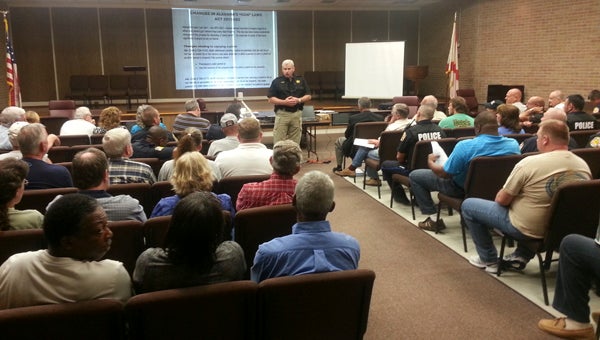Gun law subject of town hall meeting
Published 6:30 am Saturday, August 17, 2013

Escambia County Sheriff Grover Smith speaks to a packed house Thursday night at a meeting held to explain the newly passed Alabama gun law.
Alabama’s new “gun law” has often been confusing and unclear, but several law enforcement officials recently held a town hall meeting in Atmore to attempt to clear up some of that confusion.
Escambia County Sheriff Grover Smith and retired ATF agent Bill Blair explained the law and answered citizens’ questions, during a 1.5-hour presentation held at the Atmore City Hall auditorium Thursday evening.
“What we’re trying to do is provide you with the best knowledge that we can,” Smith said. “It’s in my best interest, and the best interest of all law-enforcement officers, for the good people in this county to have a legal weapon that they can use to defend themselves, if needed.”
The new law, titled Act 2013-283, was passed by the Alabama legislature earlier this year, and went into effect Aug. 1.
Smith and Blair went through the law nearly line by line, explaining what had changed and what still remained the same. Smith said the new law is a good start, but there are still improvements that can be made.
“We’re hoping that the legislature will hear from people like you, and make the changes that we feel are necessary,” Smith said.
One major change to the gun law allows for most people with a concealed-carry permit to keep a firearm in their cars while at work, provided the weapons are out of sight and locked away. There are some exceptions, including people with a history of workplace violence, domestic violence, or restraining orders.
In addition, a concealed-carry permit is no longer required to transport a pistol in a car. However, if the citizen does not have a permit, then the weapon has to be unloaded, locked away and out of reach of the driver or passengers. Citizens who have concealed-carry permits can transport their pistols in their cars at any time, whether unloaded or loaded.
Some of the other changes to the law affect the concealed-carry permits themselves. For example, permits can now be purchased for five years at a time, instead of just one year at a time. Also, a sheriff can only deny a permit if the sheriff believes the applicant is a public-safety concern; however, the sheriff must explain the reasons for the permit denial in writing.
“No one is going to be denied their gun rights,” Smith said, noting that he has only turned down a “couple” of permit applications in his time as sheriff.
The law also tries to clarify the term “disorderly conduct.” As Smith explained, it is not disorderly conduct to merely possess a holstered or secured pistol. However, if the pistol carrier also acts in a violent or noisily disruptive manner, then it could be considered disorderly conduct.
Private property owners and business owners can prohibit openly-carried weapons on their property, by posting a sign stating that guns are not allowed on the premises.
Smith and Blair discussed several other major changes to the law, but pointed out that the law is not designed to infringe on any person’s rights.
“There are a lot of emotions about gun rights in our country right now,” Smith said.
The Atmore Area Chamber of Commerce partnered with the Escambia County Sheriff’s Office to host Thursday’s presentation.




